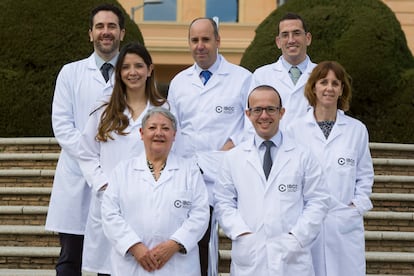Medical breakthrough: New drug multiplies survival rate for women with breast cancer
An international study has found that patients given trastuzumab deruxtecan had an estimated overall survival rate of 94% after 12 months

In the fight against cancer, advances are made as a result of small victories. Sometimes these wins may seem minor, but together, bit by bit, they are able to turn cancer – or the hundreds of cancers in existence – into a chronic disease, one that a person can live with, even if it never disappears entirely. In some cases, these small victories can be bigger than usual, as is seen in a new international study published Wednesday in the New England Journal of Medicine.
In this clinical trial, dubbed Destiny Breast-03, researchers tested the safety and effectiveness of the drug trastuzumab deruxtecan (T-DXd) in patients with HER2-positive metastatic breast cancer, a very aggressive subtype that affects around 20% of patients. T-DXd is an antibody-drug conjugate that combines a targeted cancer drug (trastuzumab) and a chemotherapy drug (deruxtecan). The first one attacks the malignant cells, where HER2 – the protein responsible for the accelerated development of the tumor – is expressed. Once at the site, the chemotherapy drug is released locally, meaning malignant cells are destroyed without causing too much damage to the healthy ones.
When trastuzumab deruxtecan was compared with trastuzumab emtansine (T-DM1), the current standard of care for patients whose tumors have not responded to first-line treatment, it achieved much better results. According to the trial, which involved 524 people from 15 countries, the percentage of participants who were alive without disease progression at 12 months was 75.8%, compared to 34.1% for those who had been given trastuzumab emtansine. What’s more, the estimated 12-month overall survival rate was 94.1%, compared to 85.9% for T-DM1.
Javier Cortés, the director of the International Breast Cancer Center (IBCC) in Barcelona, Spain, and the lead author of the research, also points out that in “the 16% [of participants who received T-DXd] the disease disappeared,” a figure that dropped to 8.7% for the current standard of care. Importantly too, this occurred in patients who had undergone many treatments, meaning they could have developed greater resistance to the new drug. “The result indicates that we are approaching the much-awaited chronification of metastatic disease,” says Cortés. Now, researchers will need to study patients over a longer period of time to see whether they remain cancer-free in the long term.

Joan Albanell, the head of the Cancer Research Program and Barcelona’s IMIM-Del Mar Hospital, who did not take part in the study, says the data from the trial show that the “drug exceeds, by a great margin, the effectiveness of the previous standard of care.” Albanell predicts that once trastuzumab deruxtecan becomes available, it will replace T-DM1 as the new standard for this type of metastasized tumors when initial treatment has started to lose effect. First, however, it must be reviewed by the European Medicines Agency (EMA), as it has only been approved as a third-line option, i.e. for patients who have not responded to the first two lines of treatment.
As is normal with the first phases of drug trials, in Destiny Breast-03, T-DXd was given to patients with the most serious cases of cancer. But Cortés says there are already plans to use the drug in “people with localized tumors, without metastasis,” and that the research team is seeing very promising results in tumors where the expression of HER2 is not so high. Some research groups are also studying the effects of the drug – which has been developed by the pharmaceutical companies AstraZeneca and Daiichi Sankyo – in patients with lung, stomach and colorectal cancer.
In the history of the small advances in the fight against cancer, trastuzumab deruxtecan is yet another example of the ingenuity of researchers, who have been able to find new tools or adapt existing ones to battle the complex and quickly-adapting disease. In the 1980s, the understanding of some of the genes behind these cancers led scientists to create treatments aimed at blocking the activity of those genes. This idea led to the development of molecules such as trastuzumab, which blocks the expression of the HER2 gene, and has prolonged the lives of millions of women with breast cancer.
Now, new hybrid drugs are using the ability of monoclonal antibodies such as trastuzumab to get inside malignant cells and then releasing powerful chemotherapy drugs. As Cortés explains, “new Trojan horses, with new antibodies, new targets and new [lethal] payloads are being studied” to attack different kinds of cancer. Each advance marks a new step forward towards a future in which cancer kills fewer people and less quickly.
Tu suscripción se está usando en otro dispositivo
¿Quieres añadir otro usuario a tu suscripción?
Si continúas leyendo en este dispositivo, no se podrá leer en el otro.
FlechaTu suscripción se está usando en otro dispositivo y solo puedes acceder a EL PAÍS desde un dispositivo a la vez.
Si quieres compartir tu cuenta, cambia tu suscripción a la modalidad Premium, así podrás añadir otro usuario. Cada uno accederá con su propia cuenta de email, lo que os permitirá personalizar vuestra experiencia en EL PAÍS.
¿Tienes una suscripción de empresa? Accede aquí para contratar más cuentas.
En el caso de no saber quién está usando tu cuenta, te recomendamos cambiar tu contraseña aquí.
Si decides continuar compartiendo tu cuenta, este mensaje se mostrará en tu dispositivo y en el de la otra persona que está usando tu cuenta de forma indefinida, afectando a tu experiencia de lectura. Puedes consultar aquí los términos y condiciones de la suscripción digital.









































